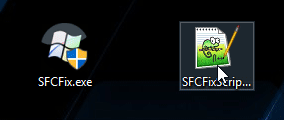First off, the Forum Posting Instructions have dead links so sorry if I'm posting wrong.
#2 the "main" issue I'm having right now is with my router apparently not providing DHCP to my PC all of sudden (just my Windows 7 installation) and Windows diagnostics isn't helping me.
#3 the installation I am currently working with was recovered from a dying hard drive that was over 10 years old and so has LOTS of little issues here built up here and there. I am avoiding a repair install at this time because I know it counts as an upgrade and therefore disables sysprep, not to mention you aren't guaranteed to keep you drivers (which would make this particular system unbootable because Win7 does NOT have drivers for it), and of course it resets a bunch of things, including updates which is a problem when you're more of a Group B user.
For now, I just want to get a clean SFC response. Does anyone have these files for me?
Unavailable repair files:
winsxs\manifests\x86_microsoft-windows-i..osticstap.resources_31bf3856ad364e35_11.2.9600.17280_en-us_114f0b9c416c7d19.manifest
winsxs\manifests\x86_microsoft-windows-m..oracle-provider-dll_31bf3856ad364e35_6.1.7601.19135_none_95159081f18f0149.manifest
winsxs\manifests\x86_microsoft-windows-ie-devtools_31bf3856ad364e35_11.2.9600.17280_none_c1f9de149c70aede.manifest
winsxs\manifests\x86_microsoft-windows-i..nternetcontrolpanel_31bf3856ad364e35_11.2.9600.17280_none_158e7754ae72e12e.manifest
winsxs\manifests\x86_microsoft-windows-ie-extcompat_31bf3856ad364e35_11.2.9600.17280_none_c3047d47333456d1.manifest
winsxs\manifests\amd64_netfx-aspnet_rc_dll_res_b03f5f7f11d50a3a_6.1.7601.22733_none_a5fd7575bf921699.manifest
winsxs\manifests\amd64_microsoft-windows-ie-adminkitbranding_31bf3856ad364e35_11.2.9600.17239_none_56be0ac76c7a5c90.manifest
winsxs\manifests\amd64_microsoft-windows-ie-devtools_31bf3856ad364e35_11.2.9600.17239_none_1e12ab1e54d3880a.manifest
winsxs\manifests\amd64_microsoft-windows-ie-diagnosticshubis_31bf3856ad364e35_11.2.9600.17239_none_f25cae8dd64139f3.manifest
winsxs\manifests\x86_microsoft-windows-i..rendering.resources_31bf3856ad364e35_11.2.9600.17280_en-us_933d3ccb600776ac.manifest
#2 the "main" issue I'm having right now is with my router apparently not providing DHCP to my PC all of sudden (just my Windows 7 installation) and Windows diagnostics isn't helping me.
#3 the installation I am currently working with was recovered from a dying hard drive that was over 10 years old and so has LOTS of little issues here built up here and there. I am avoiding a repair install at this time because I know it counts as an upgrade and therefore disables sysprep, not to mention you aren't guaranteed to keep you drivers (which would make this particular system unbootable because Win7 does NOT have drivers for it), and of course it resets a bunch of things, including updates which is a problem when you're more of a Group B user.
For now, I just want to get a clean SFC response. Does anyone have these files for me?
Unavailable repair files:
winsxs\manifests\x86_microsoft-windows-i..osticstap.resources_31bf3856ad364e35_11.2.9600.17280_en-us_114f0b9c416c7d19.manifest
winsxs\manifests\x86_microsoft-windows-m..oracle-provider-dll_31bf3856ad364e35_6.1.7601.19135_none_95159081f18f0149.manifest
winsxs\manifests\x86_microsoft-windows-ie-devtools_31bf3856ad364e35_11.2.9600.17280_none_c1f9de149c70aede.manifest
winsxs\manifests\x86_microsoft-windows-i..nternetcontrolpanel_31bf3856ad364e35_11.2.9600.17280_none_158e7754ae72e12e.manifest
winsxs\manifests\x86_microsoft-windows-ie-extcompat_31bf3856ad364e35_11.2.9600.17280_none_c3047d47333456d1.manifest
winsxs\manifests\amd64_netfx-aspnet_rc_dll_res_b03f5f7f11d50a3a_6.1.7601.22733_none_a5fd7575bf921699.manifest
winsxs\manifests\amd64_microsoft-windows-ie-adminkitbranding_31bf3856ad364e35_11.2.9600.17239_none_56be0ac76c7a5c90.manifest
winsxs\manifests\amd64_microsoft-windows-ie-devtools_31bf3856ad364e35_11.2.9600.17239_none_1e12ab1e54d3880a.manifest
winsxs\manifests\amd64_microsoft-windows-ie-diagnosticshubis_31bf3856ad364e35_11.2.9600.17239_none_f25cae8dd64139f3.manifest
winsxs\manifests\x86_microsoft-windows-i..rendering.resources_31bf3856ad364e35_11.2.9600.17280_en-us_933d3ccb600776ac.manifest


